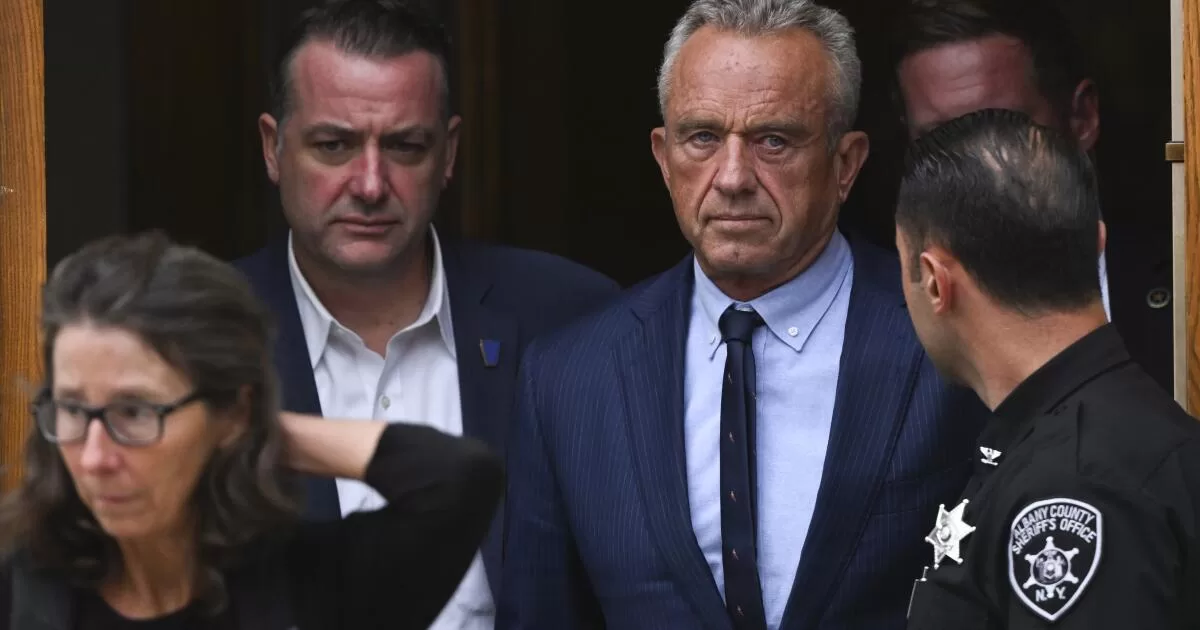A judge ruled Monday that independent presidential candidate Robert F. Kennedy Jr.’s name should not appear on New York’s ballot, ruling that he falsely claimed a New York residence on nominating petitions despite living in California.
Kennedy’s lawyers on Monday vowed to appeal ahead of the Thursday deadline. If the judge’s ruling is upheld, it would not only keep Kennedy off the ballot in New York but could also lead to challenges in other states where he used an address in New York City’s suburbs to gather signatures.
Judge Christina Ryba, in her 34-page decision, said the bedroom Kennedy claimed as his home in the state wasn’t a “bona fide and legitimate residence, but merely a ‘sham’ address that he assumed for the purpose of maintaining his voter registration” and furthering his political candidacy.
“Given the size and appearance of the spare bedroom as shown in the photographs admitted into evidence, the Court finds Kennedy’s testimony that he may return to that bedroom to reside with his wife, family members, multiple pets, and all of his personal belongings to be highly improbable, if not preposterous,” the judge wrote.
Ryba said evidence submitted in trial showed Kennedy had a “long-standing pattern” of borrowing addresses from friends and relatives so he could maintain his voter registration in New York state while actually residing in California.
“Using a friend’s address for political and voting purposes, while barely stepping foot on the premises, does not equate to residency under the Election Law,” the judge wrote. “To hold otherwise would establish a dangerous precedent and open the door to the fraud and political mischief that the Election Law residency rules were designed to prevent.”
Clear Choice Action, which supported the legal challenge, said the Monday ruling makes it clear that Kennedy “lied about his residency and provided a false address on his filing papers and candidate petitions in New York, intentionally misleading election officials and betraying voters’ trust.”
The lawsuit backed by the Democrat-aligned political action committee claims Kennedy’s state nominating petition falsely listed a residence in well-to-do Katonah while he was actually living in the Los Angeles area since 2014, when he married “Curb Your Enthusiasm” actor Cheryl Hines.
Kennedy argued during the trial that he has lifelong ties to New York and intends to move back.
During the trial, which ran for less than four days, Kennedy maintained that he began living in New York when he was 10 and that he currently rents a room in a friend’s home in Katonah, about 40 miles north of midtown Manhattan. However, Kennedy testified that he has slept in that room only once due to his constant campaign travel.
The 70-year-old candidate testified that his move to California a decade ago was so he could be with his wife, and that he always planned to return to New York, where he is registered to vote.
Barbara Moss, who rents the room to Kennedy, testified that he pays her $500 a month. But she acknowledged there is no written lease and that Kennedy’s first payment wasn’t made until after the New York Post published a story casting doubt on Kennedy’s claim that he lived at that address.
The judge also heard from a longtime friend of Kennedy’s who said the candidate had regularly been an overnight guest at his own Westchester home from 2014 through 2017, but was not a tenant there as Kennedy had claimed.
Attorneys representing several New York voters grilled Kennedy in often heated exchanges as they sought to make their case, pointing to government documents including a federal statement of candidacy with a California address, and even a social media video in which Kennedy talks about training ravens at his Los Angeles home.
Kennedy has the potential to do better than any independent presidential candidate in decades thanks to his famous name and a loyal base. Democrat and Republican strategists have expressed concerns that he could affect their candidate’s chances.
Kennedy’s campaign has said he has enough signatures to qualify in a majority of states, but his ballot drive has faced challenges and lawsuits in several, including North Carolina and New Jersey.
Clear Choice filed the New York suit on behalf of several voters in the state.
Kennedy told reporters last week that getting knocked off the ballot in New York could lead to lawsuits in other states where his campaign listed the same address.
After the trial ended Thursday, Kennedy argued that people who signed his petitions deserve a chance to vote for him.
“Those Americans want to see me on the ballot. They want to have a choice,” he said.
Associated Press writer Hill reported from Albany, Marcelo from East Meadow, N.Y. AP writer Michael Sisak contributed to this report.
